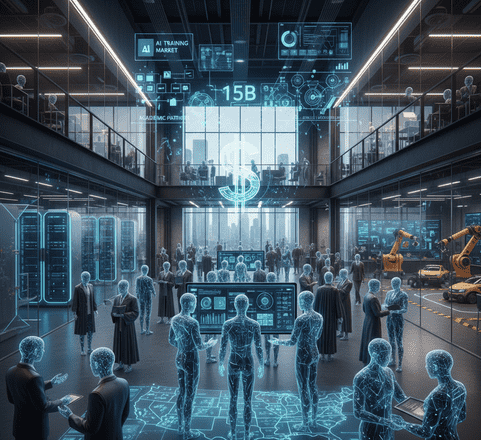Business Impact of AI Training Programs on Education Ecosystem
AI training programs are transforming the how institutions teach, how educators train, and how students learn. As education ecosystems evolve, more organizations aim to become an authorized training partner to deliver high quality learning at scale. Schools, colleges, and edtech providers see real benefits, and many want to become a partner in this new paradigm.
The Big Picture: Why AI training programs matter
AI training programs are not just about tools or algorithms. They reshape the entire education ecosystem — from curriculum design to delivery and evaluation. According to recent analysis, generative AI and adaptive learning tools are making education more personalized, dynamic, and scalable.
- Institutions can embed AI-powered assessments, quizzes, and adaptive modules that adjust to students’ pace.
- Trainers can shift from purely content creation to a facilitation role, using generative tools to design materials more efficiently.
- Students benefit from tailored learning paths, feedback loops, and real-world scenario simulations.
Thus, adopting AI training programs helps institutions upgrade their offerings and credibility, and helps learners gain skills aligned with industry demands.
Becoming an authorized training partner: strategic advantages
For institutions (schools, colleges, training centers, edtech companies), becoming an authorized training partner in AI training programs offers multiple strategic advantages:
1. Credibility & certification
When you align with recognized frameworks or certification providers, you establish yourself as an authorized training partner. That builds trust among learners, corporate clients, and regulatory bodies.
2. Access to quality content
Authorized training partners usually get access to up-to-date materials, instructor guides, and toolkits created by subject-matter experts. This ensures consistent quality across your programs.
3. Scale & brand leverage
You can leverage the brand of certification or training provider, reaching more learners, corporate clients, or government partners. It helps you position your institution or organization as credible in AI education.
4. Revenue and partnership opportunities
Becoming a partner opens up B2B deals, corporate training contracts, or collaborations with educational institutions. You get to monetize your training infrastructure and reach new audiences.
5. Continuous updates and compliance
AI evolves fast. Authorized partners often receive updated curricula, new modules, or compliance updates. This ensures your training remains relevant and aligned with latest developments.
By embracing the role of authorized training partner, institutions can strengthen their position in the the education ecosystem and differentiate from competitors.
Designing & delivering AI training programs in the education ecosystem
Let’s break down how to design and deliver AI training programs that benefit learners, educators, and institutions.
Curriculum design & alignment
- Use curriculum standards or frameworks to align modules with industry needs and certification requirements.
- Incorporate adaptive learning, so students can follow personalized paths based on assessment data.
- Add real-world simulations or interactive scenarios, especially for business or management education.
Trainer upskilling and certification
- Trainers become partners by achieving required certifications or credentials.
- They learn to use generative AI tools to create learning materials or co-design modules.
- Trainers also guide students in ethical use of AI and critical thinking.
Delivery & assessment
- Use online platforms or learning management systems to deliver content at scale. Some systems already integrate AI-driven analytics and content generation.
- Assessments can be adaptive: tests adjust difficulty based on learner responses.
- Feedback loops are faster with AI-based grading or interactive feedback.
Benefits to learners
- Learners can progress at their own pace, getting remediation or advanced modules as needed.
- They gain skills recognized by certification bodies, making them more employable.
- Because training is delivered by authorized partners, they trust the credentials and outcomes.
Challenges & considerations in implementing AI training programs
Even though the opportunities are many, there are challenges. Institutions that want to become a partner must navigate these:
- Data privacy and ethics: AI systems need to handle learner data responsibly. Institutions must ensure compliance and transparency.
- Trainer readiness: Trainers need upskilling to use AI tools effectively. Without proper training, quality may suffer.
- Investment & infrastructure: Setting up platforms, infrastructure, or training modules requires investment in tools, staff, and systems.
- Keeping content current: AI evolves rapidly. Authorized training partners must continuously update modules to remain relevant.
- Balancing automation and human touch: While AI can automate many tasks, human instructors or trainers remain essential for mentoring, ethics, critical thinking.
Case examples and trends: how education ecosystems are evolving
Here are some current trends or examples that illustrate the business impact of AI training programs:
- Education institutions are revising curricula to embed AI across disciplines, including business, engineering, and IT courses.
- Training hubs funded by industry leaders are offering AI training for educators, enabling teachers to deploy AI tools in classrooms.
- Corporations see AI training as critical; many organizations are partnering with training providers to upskill workforce.
- Academic research shows that combining generative AI tools with real‐world experiential learning improves creativity, understanding, outcomes in business education.
These trends show that the ecosystem is shifting — educators, training providers, and institutions all aiming to become partners to deliver high value training.
Conclusion
The business impact of AI training programs on the education ecosystem is profound. Institutions that choose to become an authorized training partner gain credibility, scalability, and access to current high quality content. Educators become empowered partners, delivering more personalized, effective training. Learners benefit from recognized credentials and adaptive learning experiences.
As education ecosystems evolve, being a partner in delivering AI training programs is not just an opportunity — it’s becoming a strategic necessity.
Looking ahead, institutions that move early in this shift will likely lead the future of learning, training, and certification programs.
Recent Blogs

FEATURED
Why AI Governance & Literacy Must Be at the Heart of University Curricula and Corporate Learning
February 7, 2026
FEATURED
Why the AI Instructor Shortage Is a Strategic Opportunity for Partners
February 7, 2026
FEATURED
The $15B U.S. AI Training Market- Where Enterprise & Academic Partners Fit In
February 7, 2026
FEATURED
HP’s Future of Work Program- What Universities and Training Providers Must Know
February 7, 2026
FEATURED
AI Training Must Be Rigor-Driven- What Quality Standards Partners Should Adopt
February 7, 2026

